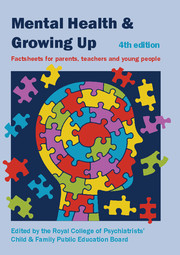Book contents
- Frontmatter
- Contents
- Contributors
- Factsheets for young people
- Factsheets for parents, carers and anyone who works with young people
- 1 Good parenting
- 2 The restless and excitable child
- 3 Dealing with tantrums
- 4 Children who soil or wet themselves
- 5 Sleep problems in childhood and adolescence
- 6 Behavioural problems and conduct disorder
- 7 Attention-deficit hyperactivity disorder (ADHD)
- 8 The child with general learning disability
- 9 Specific learning difficulties
- 10 Autism and Asperger syndrome
- 11 Depression in children
- 12 Worries and anxieties: helping children to cope
- 13 Divorce or separation of parents: the impact on children and adolescents
- 14 Death in the family: helping children to cope
- 15 The emotional cost of bullying
- 16 Traumatic stress in children
- 17 Domestic violence: its effects on children
- 18 Child abuse and neglect: the emotional effect
- 19 Drugs and alcohol: what parents need to know
- 20 Self-harm in young people
- 21 Psychosis
- 22 Schizophrenia
- 23 Bipolar disorder in children and adolescents
- 24 Obsessive–compulsive disorder in children and young people
- 25 Eating disorders in young people
- 26 Chronic physical illness: the effects on mental health
- 27 Medically unexplained physical symptoms
- 28 Chronic fatigue syndrome: helping your child get better
- 29 Parental mental illness: the problems for children
- 30 Who's who in CAMHS
26 - Chronic physical illness: the effects on mental health
from Factsheets for parents, carers and anyone who works with young people
Published online by Cambridge University Press: 02 January 2018
- Frontmatter
- Contents
- Contributors
- Factsheets for young people
- Factsheets for parents, carers and anyone who works with young people
- 1 Good parenting
- 2 The restless and excitable child
- 3 Dealing with tantrums
- 4 Children who soil or wet themselves
- 5 Sleep problems in childhood and adolescence
- 6 Behavioural problems and conduct disorder
- 7 Attention-deficit hyperactivity disorder (ADHD)
- 8 The child with general learning disability
- 9 Specific learning difficulties
- 10 Autism and Asperger syndrome
- 11 Depression in children
- 12 Worries and anxieties: helping children to cope
- 13 Divorce or separation of parents: the impact on children and adolescents
- 14 Death in the family: helping children to cope
- 15 The emotional cost of bullying
- 16 Traumatic stress in children
- 17 Domestic violence: its effects on children
- 18 Child abuse and neglect: the emotional effect
- 19 Drugs and alcohol: what parents need to know
- 20 Self-harm in young people
- 21 Psychosis
- 22 Schizophrenia
- 23 Bipolar disorder in children and adolescents
- 24 Obsessive–compulsive disorder in children and young people
- 25 Eating disorders in young people
- 26 Chronic physical illness: the effects on mental health
- 27 Medically unexplained physical symptoms
- 28 Chronic fatigue syndrome: helping your child get better
- 29 Parental mental illness: the problems for children
- 30 Who's who in CAMHS
Summary
Why are mental health problems so common?
Serious illness or disability can cause a lot of work and stress for everyone in the family, especially the parents. Children who are ill have many more stressful experiences than children without an illness. Most children will, at some time, get upset by this. Sometimes, the upset feelings and behaviour can go on and on. If they do, this can add to the child's health problems by making their life even more difficult.
How does this affect the child and family?
Following the diagnosis of a potentially serious or long-term illness, most parents and children will go through a process of coming to terms with it.
Long-term effects
• The affected child might have fewer opportunities to learn everyday skills and to develop their interests and hobbies.
• Problems at school are also common. Be sure to be in touch with your child's teacher on a regular basis. ºº Your child might have to miss a lot of school and have particular difficulties with learning. They might need extra help at school. ºº Your child might see themselves as different from other children, and they may hate this. ºº Some children may become depressed. ºº Some children may be vulnerable to bullying.
• It is easy for you as parents to be overprotective of your child. You may find it harder to say ‘no’ than you normally would, making it difficult to control your child. It is harder to allow them to manage the rough-and-tumble of childhood.
• Sometimes it can be difficult and confusing to cope with all the different doctors and other professionals involved with your child's illness. This can be very stressful for everyone.
• Brothers and sisters sometimes feel that they are being neglected. They may feel embarrassed by their ill brother or sister. They may also feel responsible for them. They can miss out on school or their social life, get bullied or lose friendships. Therefore, it is important to consider how all members of the family are challenged and affected when a child has a long-lasting illness.
What can I do to help?
It is very important to remember that although long-lasting illness does make things very difficult, most children and their families cope well. It is only a minority who experience problems.
• Live as normal a life as possible.
• Be open with your child about their difficulties.
- Type
- Chapter
- Information
- Mental Health and Growing UpFactsheets for Parents, Teachers and Young People, pp. 125 - 127Publisher: Royal College of PsychiatristsPrint publication year: 2013



